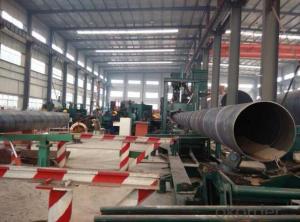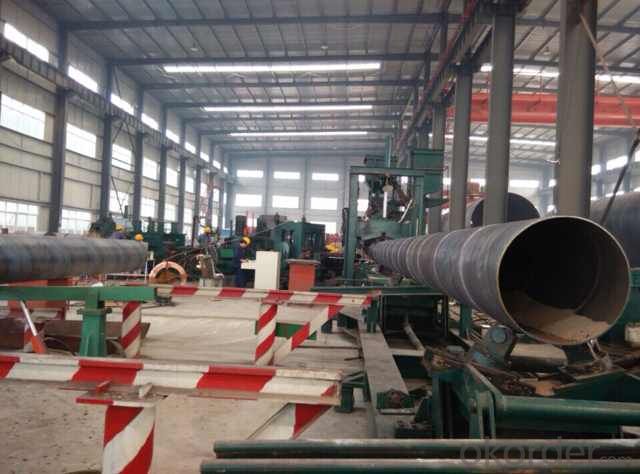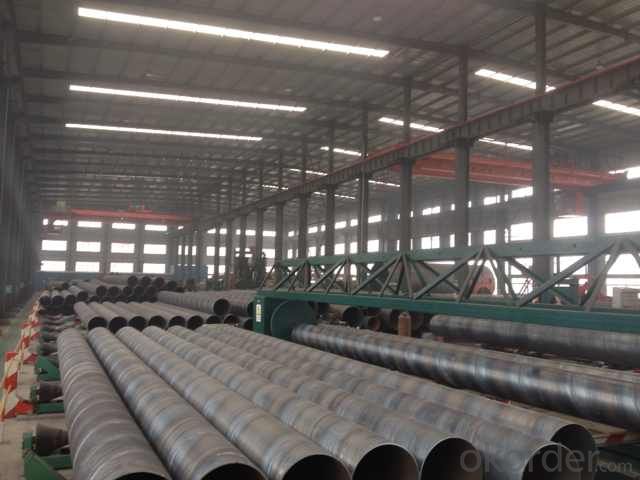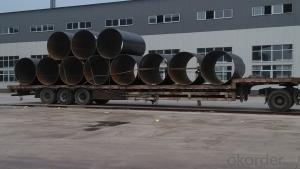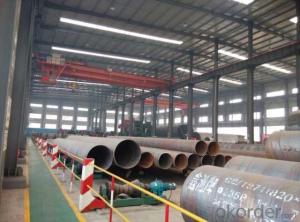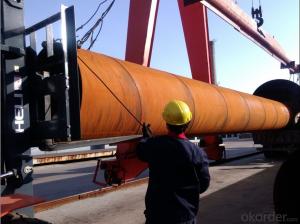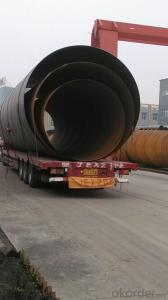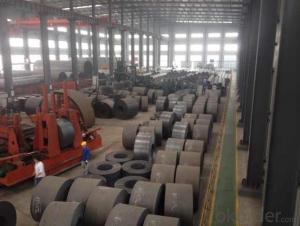SSAW CARBON STEEL PIPE 219-3920MM
- Loading Port:
- China Main Port
- Payment Terms:
- TT OR LC
- Min Order Qty:
- -
- Supply Capability:
- -
OKorder Service Pledge
OKorder Financial Service
You Might Also Like
Packaging & Delivery
Packaging Detail: | standard export packing or as customer's requirement |
Delivery Detail: | within 10 - 30 days |
Specifications
Spiral Welded Steel Pipes and Tubes
1.Material:Q195-Q235
2.Length:1-12m
3.WT:1.0-14mm
4.O.D.:219-3920mm
Product Description:
1.Material : Q235,Q345,L245,L290,L360,L415,L450,L485,GrB,X42,46,X52,X56,X60,X65,X70,X80,X100
2,Standard: SY/T5037-2000,GB/T9711-2011,API Spec 5L PSL1/PSL2,ASTM A252\A53,ISO3183,DIN17172,EN10217,JIS G3457,AWWA C200,ASTM A139,ASTM A671,ASTM A672
3.Wall thickness: 3.0mm-30mm
4.Outer diameter: φ219mm-3920mm
5,Length: 5m-12m or as customer requirement
6,Corrosion protection standard: DIN30670,DIN30671, AWWAC210, AWWA C203, SY/T0413-2002,SY/T0414-2002
7,Application: Oil, gas, natural gas, water pipe, thermal electricity pipe, steel structure engineering, etc
Q195-Q345 Material Steel Pipe's Materials
Elements | Chemical Compsition% | Mechanical Property | ||||||
| C% | Mn% | S% | P% | Si% | Yield Point (Mpa) | Tensile Strength(Mpa) | Elongation |
Q195 | 0.06-0.12 | 0.25-0.50 | <0.050 | <0.045 | <0.030 | >195 | 315-430 | 32-33 |
Q215 | 0.09-0.15 | 0.25-0.55 | <0.05 | <0.045 | <0.030 | >215 | 335-450 | 26-31 |
Q235 | 0.12-0.20 | 0.30-0.70 | <0.045 | <0.045 | <0.030 | >235 | 375-500 | 24-26 |
Q345 | <0.20 | 1.0-1.6 | <0.040 | <0.040 | <0.55 | >345 | 470-630 | 21-22 |
- Q: Are steel pipes suitable for underground oil pipelines?
- Yes, steel pipes are suitable for underground oil pipelines. Steel is a common material used for oil pipelines due to its high strength, durability, and resistance to corrosion. Underground oil pipelines are exposed to various external factors such as soil movement, moisture, and chemical substances, and steel pipes are able to withstand these conditions effectively. Additionally, steel pipes can be welded together to create a seamless and continuous pipeline, reducing the risk of leaks or ruptures. Moreover, steel pipes have been used successfully in the oil industry for many years, providing a reliable and cost-effective solution for transporting oil underground.
- Q: How are steel pipes classified based on their schedule?
- Steel pipes are classified based on their schedule, which refers to the wall thickness of the pipe. The schedule classification system includes different numbers such as 5, 10, 40, 80, etc., which indicate the thickness and strength of the steel pipe.
- Q: Can steel pipes be used for conveying steam?
- Indeed, steam can be conveyed using steel pipes. Steel pipes find frequent application in steam distribution systems owing to their impressive strength and long-lasting nature. They possess the ability to endure high temperatures and pressures associated with steam transportation without succumbing to deformation or leakage. Furthermore, steel pipes exhibit remarkable heat resistance properties, rendering them suitable for conveying steam at elevated temperatures. Nevertheless, it is crucial to guarantee adequate insulation of the steel pipes in order to avert heat loss and uphold the desired steam temperature throughout the transportation process.
- Q: How do you determine the pipe schedule for steel pipes?
- The pipe schedule for steel pipes is determined based on various factors such as the pipe's nominal size, wall thickness, and the application requirements. The pipe schedule is a standardized system that indicates the thickness of the pipe's wall, which affects its pressure rating and suitability for different applications. Factors like the fluid type, temperature, and pressure it will be subjected to help determine the appropriate pipe schedule to ensure safe and efficient operation.
- Q: What are the uses of welded steel pipes?
- The spiral submerged arc welded pipe (SY5036-83) for the delivery of pressurized fluid is made of hot rolled steel strips for tube billets, often spirally formed, welded by double submerged arc welding and used for the transmission of pressurized fluid. The steel pipe has strong pressure bearing ability and good welding performance. After a rigorous scientific examination and test, it can be used safely. The utility model has the advantages of large caliber of the steel pipe, high transmission efficiency, and investment in laying pipelines. Mainly used in the transportation of petroleum and natural gas pipelines.
- Q: Are steel pipes resistant to impact?
- Yes, steel pipes are generally resistant to impact due to their high strength and durability.
- Q: What is the bending strength of steel pipes?
- The bending strength of steel pipes can vary depending on factors such as the grade and thickness of the steel, as well as the specific manufacturing process. However, in general, steel pipes are known for their high bending strength due to the inherent strength and durability of the material.
- Q: What are the different types of flanges used with steel pipes?
- There are several types of flanges that are commonly used with steel pipes, including slip-on flanges, weld neck flanges, threaded flanges, socket weld flanges, lap joint flanges, and blind flanges. Each type has its own unique design and application, and they are used to connect and secure steel pipes together in various industrial and construction settings.
- Q: Are steel pipes suitable for use in nuclear power plants?
- Yes, steel pipes are suitable for use in nuclear power plants. They are commonly used in various applications within the plants, including cooling systems, steam generation, and transporting fluids. Steel pipes offer excellent strength, durability, and resistance to high temperatures and pressures, making them ideal for handling the demanding conditions present in nuclear power plants. Additionally, steel pipes can be designed to meet the specific requirements of nuclear applications, ensuring their safety and reliability.
- Q: Can steel pipes be used for underground water wells?
- Yes, steel pipes can be used for underground water wells. Steel pipes are commonly used for drilling water wells due to their durability, strength, and resistance to corrosion. However, it is important to ensure that the steel pipes are properly coated and protected to prevent any contamination of the underground water source.
Send your message to us
SSAW CARBON STEEL PIPE 219-3920MM
- Loading Port:
- China Main Port
- Payment Terms:
- TT OR LC
- Min Order Qty:
- -
- Supply Capability:
- -
OKorder Service Pledge
OKorder Financial Service
Similar products
Hot products
Hot Searches
Related keywords
